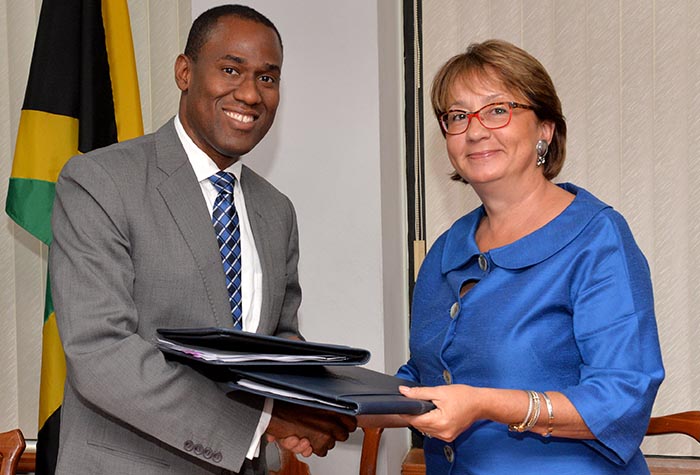Grant to Help Vulnerable Fishing Communities
By: , March 29, 2018The Key Point:
The Facts
- The agreement was signed at the Ministry of Finance and the Public Service on Wednesday (March 28) between the newly appointed Minister of Finance and the Public Service, Dr. the Hon. Nigel Clarke, and World Bank Country Manager, Galina Sotirova.
- “The Government is cognisant of the importance of the natural environment to Jamaica’s economy and fully supports and welcomes the Promoting Community-based Climate Resilience in the Fisheries Project, which is being funded by grant resources from the World Bank,” Dr. Clarke said.
The Full Story
The Ministry of Finance and the Public Service and the World Bank have signed a US$4.875 million grant agreement to help vulnerable fishing and fish farming communities in Jamaica to adapt to climate change resilient practices.
The agreement was signed at the Ministry of Finance and the Public Service on Wednesday (March 28) between the newly appointed Minister of Finance and the Public Service, Dr. the Hon. Nigel Clarke, and World Bank Country Manager, Galina Sotirova.
In his address, Dr. Clarke said this grant agreement will help strengthen the ‘Promoting Community-based Climate Resilience in the Fisheries Project’, offer support to needy fisherfolk and offer the intervention support they need regarding climate change.
“The Government is cognisant of the importance of the natural environment to Jamaica’s economy and fully supports and welcomes the Promoting Community-based Climate Resilience in the Fisheries Project, which is being funded by grant resources from the World Bank,” Dr. Clarke said.
“The fishing industry plays a crucial, social, cultural and economic role in Jamaica. There are approximately 50,000 Jamaicans who work in the fishing industry, either formally or informally and, as we know, the fishing industry is subject to climate change and that introduces a degree of vulnerability to persons who are engaged in that industry,” he said.
Dr. Clarke said the project will contribute to poverty alleviation, and that it is aligned with the 2030 development goals.
“The project will also contribute to the objectives of the 2015 National Fisheries and Agriculture Policy, aimed at improving the sustainability of Jamaica’s fisheries,” he noted.
Meanwhile, Ms. Sotirova said her organisation is pleased to offer support to the Government of Jamaica and needy persons across the island who depend on the fisheries sector to earn money.
“The sector is heavily climate sensitive. The people who rely on it, particularly for their livelihoods, are very vulnerable. Current weather extremes already affect millions of people, putting food and water security at risk and threaten agricultural supply chains and coastal cities. For this reason, over the past decade, the World Bank has been integrating climate change considerations into all of the investments and operational decisions that we have,” Ms. Sotirova said.
The ‘Promoting Community-based Climate Resilience in the Fisheries Sector Project’ aims to strengthen the fisheries policy and regulatory framework for climate resilient fisheries and aquaculture management; build capacity to promote sustainable fisheries management; support fishing and fish farming communities to adopt climate-resilient aquaculture, coastal mari-culture/poly-culture, diversify their livelihoods and raise awareness of climate change impacts on the fisheries sector.




